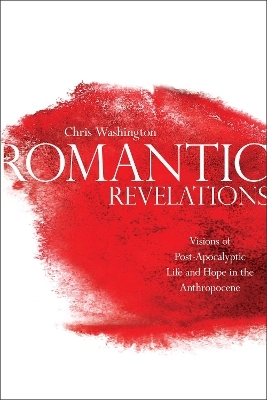
Romantic Revelations
Visions of Post-Apocalyptic Life and Hope in the Anthropocene
Seiten
2019
University of Toronto Press (Verlag)
978-1-4875-0450-2 (ISBN)
University of Toronto Press (Verlag)
978-1-4875-0450-2 (ISBN)
- Lieferbar (Termin unbekannt)
- Versandkostenfrei
- Auch auf Rechnung
- Artikel merken
Romantic Revelations argues that Percy Shelley, Mary Shelley, Lord Byron, John Clare, and Jane Austen sketch out a post-apocalyptic world that is paradoxically the vision that offers us hope. Washington contends that these authors craft an optimistic vision of the future that leads to a new politics.
Romantic Revelations shows that the nonhuman is fundamental to Romanticism’s political responses to climatic catastrophes. Exploring what he calls "post-apocalyptic Romanticism," Chris Washington intervenes in the critical conversation that has long defined Romanticism as an apocalyptic field. "Apocalypse" means "the revelation of a perfected world," which sees Romanticism’s back-to-nature environmentalism as a return to paradise and peace on earth. Romantic Revelations, however, demonstrates that the destructive climate change events of 1816, "the year without a summer," changed Romantic thinking about the environment and the end of the world. Their post-apocalyptic visions correlate to the beginning of the Anthropocene, the time when humans initiated the possible extinction of their own species and potentially the earth. Rather than constructing paradises where humans are reborn or human existence ends, the later Romantics are interested in how to survive in the ashes after great social and climatic global disasters.
Romantic Revelations argues that Percy Shelley, Mary Shelley, Lord Byron, John Clare, and Jane Austen sketch out a post-apocalyptic world that, in contrast to the sunnier Romantic narratives, is paradoxically the vision that offers us hope. In thinking through life after disaster, Washington contends that these authors craft an optimistic vision of the future that leads to a new politics.
Romantic Revelations shows that the nonhuman is fundamental to Romanticism’s political responses to climatic catastrophes. Exploring what he calls "post-apocalyptic Romanticism," Chris Washington intervenes in the critical conversation that has long defined Romanticism as an apocalyptic field. "Apocalypse" means "the revelation of a perfected world," which sees Romanticism’s back-to-nature environmentalism as a return to paradise and peace on earth. Romantic Revelations, however, demonstrates that the destructive climate change events of 1816, "the year without a summer," changed Romantic thinking about the environment and the end of the world. Their post-apocalyptic visions correlate to the beginning of the Anthropocene, the time when humans initiated the possible extinction of their own species and potentially the earth. Rather than constructing paradises where humans are reborn or human existence ends, the later Romantics are interested in how to survive in the ashes after great social and climatic global disasters.
Romantic Revelations argues that Percy Shelley, Mary Shelley, Lord Byron, John Clare, and Jane Austen sketch out a post-apocalyptic world that, in contrast to the sunnier Romantic narratives, is paradoxically the vision that offers us hope. In thinking through life after disaster, Washington contends that these authors craft an optimistic vision of the future that leads to a new politics.
Chris Washington is Assistant Professor of English at Francis Marion University.
Acknowledgments
Introduction: There Is a Light That Never Goes Out?
1. The Mind Is Its Own Place: What Percy Shelley's Mountain Did Not Say
2. No More Cakes and Ale, Only Oil Slicks: Mary Shelley’s Post-Apocalyptic State of Nature
3. Byron’s Speculative Turn: The Biopolitics of Paradise
4. Birds Do It, Bees Do It: John Clare, Biopolitics, and the Nonhuman Origins of Love
5. The Best of All Possible End of the Worlds: Jane Austen’s Frankenstein, or Love in the Ruins
Coda: After Extinctualism: Hope for Life
Notes
Bibliography
Index
| Erscheinungsdatum | 11.09.2019 |
|---|---|
| Verlagsort | Toronto |
| Sprache | englisch |
| Maße | 160 x 235 mm |
| Gewicht | 520 g |
| Themenwelt | Geisteswissenschaften ► Sprach- / Literaturwissenschaft ► Anglistik / Amerikanistik |
| Geisteswissenschaften ► Sprach- / Literaturwissenschaft ► Literaturgeschichte | |
| Geisteswissenschaften ► Sprach- / Literaturwissenschaft ► Literaturwissenschaft | |
| ISBN-10 | 1-4875-0450-0 / 1487504500 |
| ISBN-13 | 978-1-4875-0450-2 / 9781487504502 |
| Zustand | Neuware |
| Haben Sie eine Frage zum Produkt? |
Mehr entdecken
aus dem Bereich
aus dem Bereich
Poetik eines sozialen Urteils
Buch | Hardcover (2023)
De Gruyter (Verlag)
CHF 83,90
Entzauberung und Faszination des Immergleichen in Literatur und Film
Buch | Softcover (2024)
Springer Fachmedien Wiesbaden GmbH (Verlag)
CHF 118,95
Buch | Softcover (2024)
belleville (Verlag)
CHF 27,95


